You are viewing the Cultures of Knowledge Blog archive for the ‘Publications’ Category:
James Brown
December 14, 2012
Podcasts, Projects and Centres, Publications, Websites and Databases
Tags: Archives, Centre for Editing Lives and Letters, Diplomatic History, England, Materiality, Networks, Seventeenth Century, Sixteenth Century, Union Catalogue
 Those seeking to balance the port and mince pies this holiday season with some state-of-the-art reflections on early modern epistolarity are in luck: the latest issue of Lives & Letters – the free online journal of UCL’s Centre for Editing Lives and Letters – is devoted to New Directions in the Study of Early Modern Correspondence.
Those seeking to balance the port and mince pies this holiday season with some state-of-the-art reflections on early modern epistolarity are in luck: the latest issue of Lives & Letters – the free online journal of UCL’s Centre for Editing Lives and Letters – is devoted to New Directions in the Study of Early Modern Correspondence.
Guest-edited by James Daybell and Andrew Gordon, and developing out of a conference held at Plymouth University in 2011, the issue features an introduction to the latest developments in the field (in which EMLO gets a name-check); eight case studies of particular correspondents and correspondence networks; and a spectacularly useful select bibliography on the manuscript letter in early modern England. All articles are free for download from the journal website. James also contributed to our 2011 seminar series (here’s the podcast), while his latest book on the material letter has just been reviewed by the IHR.
Edited by the Foundations of Modern Thought Research Centre at the University of Bucharest, and featuring our very own Howard Hotson on its Advisory Board, the new publication is billed as a ‘an interdisciplinary, peer-reviewed journal of intellectual history, dedicated to the exploration of the interactions between philosophy, science, and religion in Early Modern Europe’. The epistolary opener features seven contributions (as well as related review essays and book reviews) on particular correspondents and correspondence networks, including an article by Noel Golvers on Sino-European exchanges in the seventeenth and eighteenth centuries; Noel initiated our seminar series in 2010 with a wonderful paper on this topic (listen to the podcast). For full details and to order your copy, visit the journal webpage.
Philip Beeley
November 13, 2012
Front Page, Project Updates, Publications
Tags: Archives, Book History, Electronic Enlightenment, History of Medicine, History of Scholarship, History of Science, John Wallis, John Wilkins, London, Oxford, Ralph Bathurst, Respiration, Robert Boyle, Trinity College
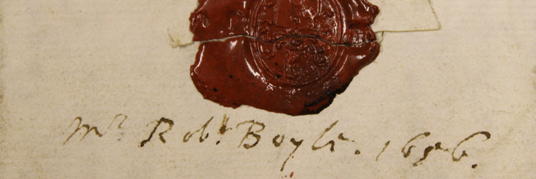
While ferreting around in the archives of Trinity College, Oxford finalizing annotations for Volume IV of The Correspondence of John Wallis, I came across a letter from Robert Boyle, the eminent natural philosopher, to the theologian and physician Ralph Bathurst, whose papers I was exploring. This manuscript was previously missing; while the letter is included in the monumental 2001 edition of Boyle’s complete correspondence (and can be consulted in Electronic Enlightenment), the editors had to base their text on a version of the letter in a 1761 print edition of Bathurst’s papers, rather than on this autograph original. Here’s the letter:
Trinity College Oxford Archive, Fellows 2/1/1: A new Boyle original. Images reproduced courtesy of Trinity College.
The missive – described by Boyle as a ‘hasty blotted scribble’ – is an intriguing one, shedding fascinating light on a failed publishing project. It was sent in April 1656, one of those Oxford months when lots of things were happening (even Henry Oldenburg was in town, inter alia, to sample the rich scientific culture developing in and around the university). Unfortunately for Oldenburg, two giants of the local philosophical scene were absent when he arrived. His friend Robert Boyle, who had moved to Oxford around the beginning of the year (and would stay on and off until 1668) had gone to London. Likewise in the metropolis was John Wilkins, the warden of Wadham College, who had gathered around him an illustrious circle of like-minded practitioners, including Seth Ward, Thomas Willis, and Wallis.

Sender Robert Boyle

Recipient Ralph Bathurst
One of Boyle’s main tasks while in London was evidently to see through the press a promising book by Ralph Bathurst, one of the members of this glittering cadre of experimentalists. A fellow of Trinity College, who would go on to be College president and later vice-chancellor of the University, Bathurst had written three lectures on respiration as part of his examination as doctor medicinae in 1654; during the following two years, these texts were circulated scribally among the Wilkins circle, which evidently suggested revisions and emendations. Bathurst added numerous marginal notes to the manuscript of the Praescriptiones tres de respiratione and – notoriously reluctant to publish his work – was probably encouraged to do so by his celebrated friends. Boyle headed to the capital with the manuscript to spearhead the enterprise.
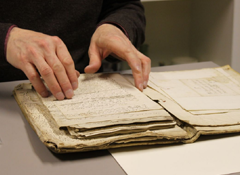
Bathurst’s letter book
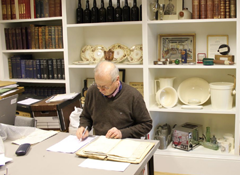
Objects and Letter-Objects
In the absence of Boyle and Wilkins (the two men who had promoted the venture most strongly), however, Bathurst began to get cold feet. Probably around the end of March, in a letter that is now lost he wrote to Boyle in London to inform him of his change of heart and to request that the manuscript be returned. Boyle did not receive the letter immediately, for he had been invited by Wilkins to inspect some peculiar natural phenomena elsewhere. Writing back to Bathurst in the April letter, Boyle expressed his disappointment at the ‘unwelcome orders you send me, concerning your excellent Lectures’, which presumably placed him in an awkward position. Indeed, Wilkins was evidently hoping to get plans back on track, and instructed Boyle not to follow Bathurst’s wish ‘to have those Jewells sent backe to Oxford’.
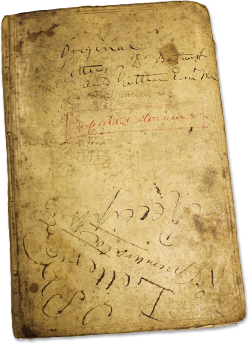 The efforts of Wilkins and Boyle to save the book were to no avail; Bathurst’s Praescriptiones tres de respiratione first saw light of day when it was published posthumously – alongside this letter – in Warton’s The Life and Literary Remains of Ralph Bathurst (London, 1761). The collapse of the project to publish Bathurst’s Praescriptiones illustrates the close relations between knowledge-makers in Oxford and London at this time. The incident even came to the attention of Samuel Hartlib, who recorded in his Ephemerides ‘Mr Boyle knows one that hath an excellent Ms. De Respiratione which hee will not publish’.
The efforts of Wilkins and Boyle to save the book were to no avail; Bathurst’s Praescriptiones tres de respiratione first saw light of day when it was published posthumously – alongside this letter – in Warton’s The Life and Literary Remains of Ralph Bathurst (London, 1761). The collapse of the project to publish Bathurst’s Praescriptiones illustrates the close relations between knowledge-makers in Oxford and London at this time. The incident even came to the attention of Samuel Hartlib, who recorded in his Ephemerides ‘Mr Boyle knows one that hath an excellent Ms. De Respiratione which hee will not publish’.
We are extremely grateful to Professor Michael Hunter for confirming the originality of this manuscript and for additional help and advice on its background.
James Brown
October 19, 2012
Conferences and Workshops, Events, Front Page, Podcasts, Project Updates, Publications
Tags: Animals, Charles Perrault, Comte de Buffon, Francis Willughby, Frogs, History of Medicine, History of Science, Insects, John Ray, Martin Lister, Natural History, Toads
The special issue publishes the proceedings of the day conference History Comes to Life: Seventeenth-Century Natural History, Medicine, and the New Science, organized by Anna Marie at The Royal Society in April (with the financial and logistical support of the project, The Royal Society, the Wellcome Trust, the John Fell Fund, and the BSHS). It features six fresh and fascinating articles from leading authorities on a wide range of topics at the intersection of seventeenth-century natural history, medicine, and science, including Buffon and animals, Francis Willughby and insects, and Jan Swammerdam’s abiding intellectual infatuation with frogs and toads. You can now enjoy early access to the articles online; the print version of the special issue will be available at the end of November. You can also listen to the podcasts from the conference. Congratulations to Anna Marie and the rest of the contributors!
James Brown
October 04, 2012
Events, Front Page, Podcasts, Project Updates, Publications
Tags: Droz, Editions, History of Scholarship, History of Science, Joseph Justus Scaliger, Religion, Sixteenth Century

The Correspendence of Joseph Justus Scaliger (8 volumes) has just been published by Droz. Edited by Paul Botley and Dirk van Miert, with supervision, advice, and coordination from Henk Jan de Jonge, Anthony Grafton, and Jill Kraye, the simultaneous appearance of all eight volumes of this major early modern corpus represents one of the most impressive scholarly achievements of modern times (work on Scaliger’s correspondence only started in earnest in 2004).
The critical edition contains nearly 1,700 letters sent to or by the French polymath, all of which are presented alongside a complete scholarly apparatus as well as English synopses. Scaliger’s correspondents include such luminaries as Dominicus Baudius, Tycho Brahe, Isaac Casaubon, the Dousa and Dupuy families, Daniel Heinsius, Johannes Kepler, Justus Lipsius, Claudius Salmasius, Jacques-Auguste de Thou, Marcus Welser, and Joannes Woverius. The edition was supported by the Andrew W. Mellon Foundation and (via Anthony Grafton’s Balzan Prize) the Balzan Foundation, with additional contributions from London’s Warburg Institute, the Scaliger Institute of the University of Leiden, and a number of Dutch societies and foundations.
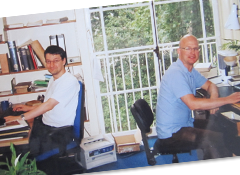
No let-up in the pace: editors at work
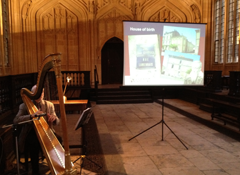
The scene is set for the reception
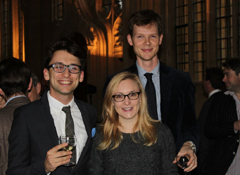
The next generation of edition-makers
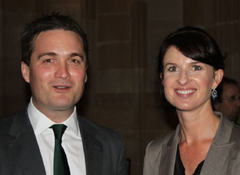
Rhodri Lewis and Sarah Rivett
This major publishing event was celebrated at the second of two publisher-sponsored drinks receptions at our latest conference Communities of Knowledge: Epistolary Cultures in the Early Modern World (20-22 September, 2012). Nearly one hundred delegates and guests assembled in the Bodleian Library’s magnificent Divinity School to toast the launch, where they were treated to wine, cocktail snacks, music from professional harpist Stephen Dunstone, ‘The Path to Scaliger: An Intellectual Journey’ (an animated presentation created especially for the occasion by Dirk), and speeches from Anthony Grafton and Max Engammare, Director of Droz. In related news, metadata from the edition is currently being prepared for inclusion in our union catalogue Early Modern Letters Online, while Dirk and Paul can be heard discussing the Scaliger corpus in their joint contribution to our 2010 seminar series.
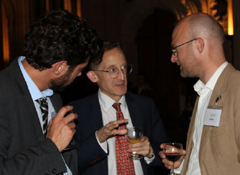
Jan Loop, Noel Malcolm, and Dirk
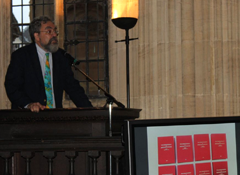
Anthony Grafton’s address
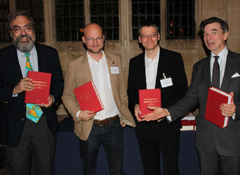
Not pictured: four more volumes
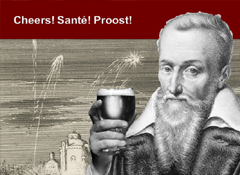
Scaliger raises a glass
We congratulate Paul, Dirk, Henk Jan, Anthony, Jill, and Max (and thank them, as well as Wilma Minty and the rest of the Bodleian’s Historic Venues team, for their help with the reception), and wish the edition every success! For more information and to order online – in hard copy or electronic format – please visit the publisher’s website or download the flyer (pdf).
A leading journal in early modern studies, focusing in particular on close textual analyses of fresh sources and innovative interdisciplinary approaches, The Seventeenth Century is published four times per year. During the reception, over eighty delegates and guests assembled in the modern and airy senior common room and terrace of the Faculty of English to toast this new relationship over sparkling wine and delicious canapés provided by the Organic Deli Café. We were also treated to short speeches from Professor Richard Maber, General Editor of the journal and speaker at the conference, and Adam Burbage, Managing Editor at Routledge. In moves close to the Project’s heart, both described plans to increase the journal’s online presence, including the digitization of all back issues, full-colour publication online, a new digital submission and refereeing system for prospective authors, and a new journal website on Routledge’s cutting-edge platform.

Adam Burbage from Routledge samples some canapés
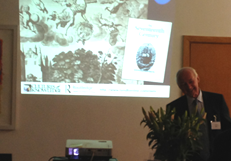
General Editor Richard Maber describes the new partnership
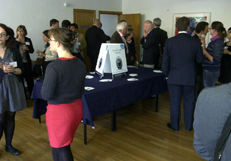
Guests circulate around the Routledge display table
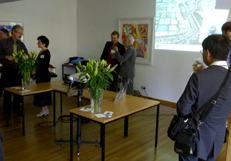
Lilies, celebratory slides, sparkling wine, sparkling conversation
We congratulate Richard as well as Adam, Mark, Andrea, Rachel, and Louise from Routledge (and thank them for their help with and generous sponsorship of the reception), and wish The Seventeenth Century every success in its new home! Stay tuned to developments on the publisher’s website.
 Those seeking to balance the port and mince pies this holiday season with some state-of-the-art reflections on early modern epistolarity are in luck: the latest issue of Lives & Letters – the free online journal of UCL’s Centre for Editing Lives and Letters – is devoted to New Directions in the Study of Early Modern Correspondence.
Those seeking to balance the port and mince pies this holiday season with some state-of-the-art reflections on early modern epistolarity are in luck: the latest issue of Lives & Letters – the free online journal of UCL’s Centre for Editing Lives and Letters – is devoted to New Directions in the Study of Early Modern Correspondence.
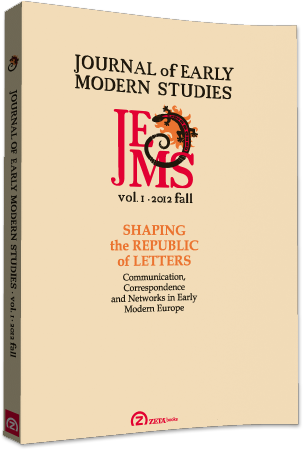

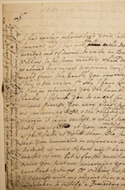
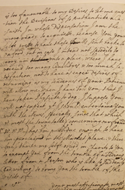
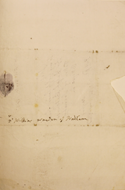
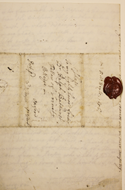




 The efforts of Wilkins and Boyle to save the book were to no avail; Bathurst’s Praescriptiones tres de respiratione first saw light of day when it was published posthumously – alongside this letter – in Warton’s
The efforts of Wilkins and Boyle to save the book were to no avail; Bathurst’s Praescriptiones tres de respiratione first saw light of day when it was published posthumously – alongside this letter – in Warton’s 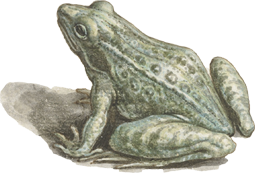 Our pertinacious (we’re running out of adjectives)
Our pertinacious (we’re running out of adjectives) 








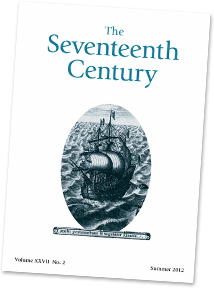





 Join
Join 